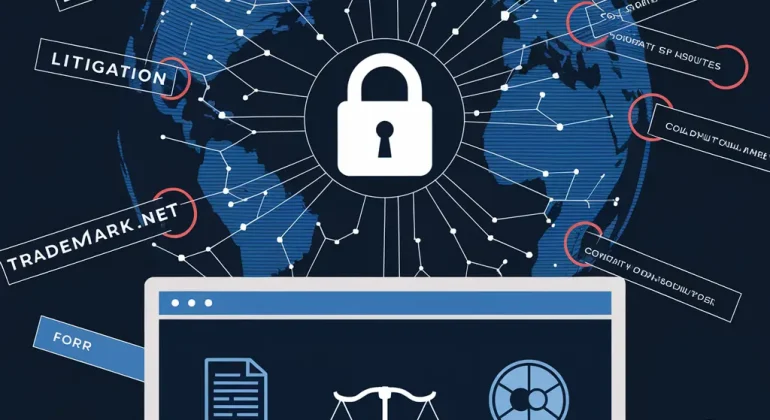UDRP: The Côtes de Provence Wine Syndicate loses its fight for the domain name
The present proceedings – Syndicat des Vins Côtes de Provence v. Pascal Leemann-Pluot – Case No. D2024-5223 – concern the domain name <cotesdeprovence.com>, registered on January 29, 2007 by the Respondent, an individual domiciled in the United States. The Complainant, Syndicat des Vins Côtes de Provence, considered that this domain name infringed its rights, in particular its French trademarks and its Côtes de Provence appellation protected by French and European regulations.
Background and Position of the Complainant
- Appellation and missions of the Syndicate
The Complainant is a trade association created in 1933 to defend and promote the “Côtes de Provence” appellation d’origine contrôlée (AOC), which designates a geographical wine-growing area covering several communes in the Provence region. It emphasizes its high profile, its substantial production (more than 130 million bottles in 2022), as well as its trademarks registered in France.
- Trademarks claimed
The Complainant relies mainly on two French trademarks:
- A purely figurative trademark (no. 1432164) representing a bottle of wine (without any relevant textual element).
- A semi-figurative trademark (no. 3753570) including the words “SYNDICAT DES VINS COTES DE PROVENCE”.
- He also emphasizes that he is the holder of several domain names containing the expression “cotesdeprovence”, such as <cotesdeprovence.fr>, <odg-cotesdeprovence.fr> or <odg-cotesdeprovence.com>.
- Arguments about similarity and confusion
The Complainant considers that the domain name <cotesdeprovence.com> reproduces identically the essential element of its signs, namely “COTES DE PROVENCE”. Despite the semi-figurative form of its trademark, it considers that the dominant verbal element is “Côtes de Provence” and that there is therefore a likelihood of confusion.
- Rights and legitimate interests
The Complainant claims that the Defendant has not been authorized to use the appellation or to register a domain name corresponding to its trademarks or its AOC/PDO. It adds that the use of the site associated with the domain name (pages of pay-per-click advertising links related to the sale or delivery of wine) does not constitute legitimate or bona fide use.
- Registration and use in bad faith
The Complainant maintains that the expression “Côtes de Provence” enjoys a strong reputation and that it is unlikely that the Defendant was unaware of the existence of the AOC and related rights. The association of the domain name with a site of sponsored links targeting the wine estate would demonstrate a desire to profit from the reputation of the appellation and to create confusion among Internet users, which would characterize bad faith.
Defendant’s position
The Respondent did not participate in the proceedings and did not submit any arguments in response. The only information available is that provided by the Complainant and the Center’s findings, in particular that the site linked to the domain name displayed PPC links relating to wine and that no active use by the Respondent (such as its own commercial site) has been proven.
Panel Analysis
- a) Similarity between the domain name and the trademarks
- The Panel notes that the Complainant’s entirely figurative trademark (no. 1432164) does not include a word element, and therefore cannot be compared textually to the domain name <cotesdeprovence.com>.
- The second trademark (no. 3753570), registered in 2010 (i.e. after the registration of the domain name in 2007), includes the element “SYNDICAT DES VINS COTES DE PROVENCE”, but is not strictly equivalent to “COTES DE PROVENCE” alone. The Panel recognizes that the Complainant considers it to include a dominant element “Côtes de Provence”, but notes the absence of concrete evidence to demonstrate that this verbal segment would be protected in isolation or considered the pre-eminent part of the trademark.
- b) Rights or legitimate interests of the Respondent
In view of the Panel’s conclusion on bad faith (see below), it was not considered necessary to make a final decision on the question of legitimate rights or interests. In accordance with the UDRP procedure, failure to prove bad faith of registration and use is sufficient to reject the complaint, without it being mandatory to analyze the second element.
- c) Registration and use in bad faith
- Priority of the trademark over the domain name
The semi-figurative trademark mentioning “Côtes de Provence” dates from 2010, while the domain name was registered in 2007, which makes it unlikely that there was an initial intention to specifically target the Complainant’s trademark.
- Reputation of the Complainant vs. reputation of the wine region
Even if the appellation “Côtes de Provence” is recognized in the wine sector, the Panel notes that the Complainant’s argument does not prove that the Respondent was aware of the syndicate or its trademarks in order to exploit their reputation. It is plausible that the Defendant wanted to capitalize on the interest in the region or the “Côtes de Provence” wine, without necessarily targeting the owner of the trademarks or the organization managing the AOC.
- Advertising links (pay-per-click)
The advertising content of the site is focused on the theme of wine, but does not in itself demonstrate the intention to exploit the Complainant’s trademark. To characterize bad faith, it would have been necessary to establish that the Defendant was aware of the Syndicate and its rights or that it was specifically targeting the trademark.
- Panel’s conclusion
Not being able to find any evidence proving a deliberate intention to appropriate the reputation of the Syndicate or its brands, and noting moreover that the registration predates the semi-figurative trademark, the Panel finds that the Complainant does not fulfill the condition of bad faith within the meaning of the UDRP Policy.
Decision
In the absence of sufficient evidence of bad faith in the registration and use of the domain name, the complaint is rejected. The domain name <cotesdeprovence.com> therefore remains in the possession of the Respondent.
Conclusion
The Panel, applying the rules of the UDRP, concludes that the Complainant does not meet the requirement to establish bad faith registration and use by the Respondent. Accordingly, the complaint is dismissed.
The UDRP aims to resolve conflicts between trademarks and domain names, not between geographical indications and domain names. In this case, in the absence of a similar trademark and proof of bad faith on the part of the domain name holder, the outcome of this decision is in accordance with the UDRP rules.
This decision highlights the importance of owning a trademark to effectively defend one’s interests when faced with the registration of a domain name.
The Côtes de Provence Wine Syndicate has also acted, this time successfully, via the French administrative procedure PARL-EXPERT to recover the same domain name in <.fr>: add link.
Dreyfus Law Firm, with its expertise in intellectual property and domain name protection, assists its clients in defending their rights against the risks of cybersquatting and infringement of their IP rights. We act in UDRP disputes, analyzing each case from the perspective of trademark law and regulations specific to protected geographical indications (PGI) and controlled designation of origin (CDO). Thanks to our experience in the strategic management of domain name portfolios, we implement tailored solutions to anticipate, monitor and defend the digital assets of our clients, whether they are producers, professional associations or companies in the wine and food industry.
FAQ
- What is the UDRP procedure and when is it applicable?
The UDRP (Uniform Domain Name Dispute Resolution Policy) procedure is a mechanism set up by ICANN to resolve domain name disputes. It applies when the complainant considers that a domain name is identical or similar to a trademark that they hold, that the defendant has no right or legitimate interest in the domain and that they have registered and are using the domain in bad faith.
- Can a domain name containing a protected designation of origin (PDO) be recovered?
The protection of designations of origin is governed by specific regulations (French and European, for example). However, the UDRP generally only recognizes rights related to trademarks. It may therefore be more difficult to claim a domain name on this basis alone. Legal action based on PDO or unfair competition laws could be an alternative.
- Can a semi-figurative trademark be sufficient to obtain a domain name via the UDRP?
It all depends on the textual elements of the trademark. If the domain name in question only includes part of a semi-figurative trademark, the chances of success may be reduced, especially if this part is not clearly identified as dominant.
- Can a domain name registered before a trademark be recovered under the UDRP?
As a general rule, if the domain name was registered before the trademark claimed by the complainant, it is difficult to prove bad faith. However, there are some exceptions, particularly if the defendant was already aware of the trademark and intended to exploit it abusively.
- Is the display of advertising links (pay-per-click) on a site proof of bad faith?
Not necessarily. Although some cases of cybersquatting are characterized by the exploitation of a domain name for sponsored links, bad faith must be demonstrated. If the domain contains a generic or geographical term and the defendant does not specifically target a trademark, it may be difficult to prove abusive use.
- Can a right to a designation of origin be invoked if it is well known?
The reputation of an appellation of origin can be a factor, but it does not automatically confer a right under the UDRP. As the procedure is trademark-oriented, it is often preferable to resort to actions based on the specific regulations of appellations or on the law of unfair competition.
- What can be done if a UDRP complaint is rejected?
If a UDRP complaint is rejected, other options exist:
- Legal action: depending on the country, it may be possible to invoke trademark law, appellation of origin law or unfair competition law.
- Negotiation: an amicable approach can be attempted with the domain holder.
- Monitoring and future actions: monitor possible new uses of the domain and intervene if misuse is detected.
- How can a name associated with a designation of origin be effectively protected?
- Register a word mark including the designation as soon as possible.
- Register the relevant domain names before a third party does.
- Actively monitor domain registrations and online uses.
- Act quickly in the event of a disputed registration, via a UDRP procedure or legal action.
Dreyfus Law Firm works in partnership with a global network of lawyers specializing in intellectual property.
Follow us on social media!









 The legitimate interest of the respondent justified by the use of his trademark in connection with the services for which it is registered.
The legitimate interest of the respondent justified by the use of his trademark in connection with the services for which it is registered.

 The name < PARISTECH.ORG >, operated by Parisian entrepreneurs, would not infringe Paritech’s rights.
The name < PARISTECH.ORG >, operated by Parisian entrepreneurs, would not infringe Paritech’s rights.
 The trademark invoked by the applicant does not necessarily have to be protected in the country of the respondent
The trademark invoked by the applicant does not necessarily have to be protected in the country of the respondent